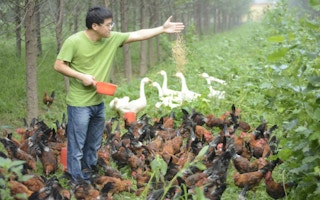In Wuyi County, one of the poorest regions in China’s Hebei province, a combination of e-commerce, blockchain technology and government will has lifted the area from the national poverty list after rural farmers were able to tap into the country’s booming market for safe and organic products.
To continue reading, subscribe to Eco‑Business.
There's something for everyone. We offer a range of subscription plans.
- Access our stories and receive our Insights Weekly newsletter with the free EB Member plan.
- Unlock unlimited access to our content and archive with EB Circle.
- Publish your content with EB Premium.
According to JD.com (JD), one of China’s largest e-commerce platforms, their ‘Running Chicken’ initiative, which aims to bring free-range chickens from farm to table and help alleviate rural poverty, has seen the average income in Wuyi increase by 2000 (US$298) to 3000 yuan (US$447) in the last few years.
JD has since launched two similar initiatives ‘Swimming Duck’ and ‘Flying Pigeon’ in Jiangsu and Hebei province respectively, to help more disadvantaged farmers and promote the sale of agricultural products from the countryside to cities.
‘Running Chicken’, which was introduced in 2016, provides interest-free loans to farmers who can purchase chicks from JD’s supplier network and raise them in a healthy, well-monitored environment. The chickens are then bought directly by the company and sold online at a premium price.
“The project showcases how e-commerce can benefit society as a whole by alleviating poverty while bringing high-quality, safer, and better tasting produce to consumers,” said Xiaowen Liu, key projects lead of fresh food sourcing at JD.
Free-range or free-roaming chickens spend at least 50 per cent of their time outdoors, interacting with other chickens and exercising in fresh air. They are also fed a healthy diet of grains and fresh fruit and vegetables three times a week.
Research shows that such chickens are not just raised in a more ethical manner, but are better in taste and for human health too, as they are higher in protein and unsaturated “good” fatty acids.
“
E-commerce can benefit society as a whole by alleviating poverty while bringing high-quality, safer, and better tasting produce to consumers.
Xiaowen Liu, key projects lead of fresh food sourcing at JD
In ‘Running Chicken’, local governments aid in ensuring the loans are risk-free for farmers, while the chickens’ step count and living conditions are monitored by specially-designed pedometers attached to their feet along with video from the camera installed at the farm.
“At the start, we hoped that the farmers could raise the chickens in their own yard, but most of them are elderly, sick and have very little education. They have few other variable means of living,” JD communications manager Yuchuan Wang tells Eco-Business. “So we established a farm in the county that would allow the local farmers to raise their chickens with help from local third parties.”
The farmers are also able to get part-time jobs on the farm, such as cleaning the premises and slaughtering the chickens.
JD is not the only e-commerce giant that has used their online business model to tackle poverty and create opportunities for rural entrepreneurship and employment.
Other large platforms such as Alibaba’s Taobao and Pinduoduo are allowing rural people to connect with urban consumers, as the Chinese government strengthens efforts to bridge the country’s inequality gap by promoting internet adoption and providing infrastructural and organisational support in the countryside.
Blockchain quells food safety worries
Although e-commerce is being viewed by the Chinese government as a viable way towards poverty relief and sustainable development in rural areas, demand for organic and local products from the country’s growing middle class primarily stems from concerns over food safety.
“In the past few years we have had a few food safety scandals, so the Chinese consumer is now attaching more importance to the quality of products – where they come from and the whole process of how they got from farm to table,” said Yuchuan, who added that consumer demand for authentic and natural products have risen steadily over the years.
In 2012, Taobao tapped into growing demand in China for pollutant and chemical-free food by launching its first vertical mall dedicated to organic produce. Years later, more companies are using blockchain technology to meet the same demand and improve supply chain transparency in order to gain the trust of increasingly conscious consumers.
In the case of ‘Running Chicken’, customers are informed of the exact location and living conditions of the chickens from farmers who upload live pictures of the farm. Blockchain technology prevents anyone from making changes to the uploaded information.
“Once the customer buys the chicken from our site, they have access to the blockchain tracing page, which lists product information such as the location of the chicken farm, the breeder’s name, its lifespan and the slaughter date. They’re able to scan the QR code on the package to get all this information,” said Yuchuan.
She added: “Although many suppliers in China may not have very advanaced knowledge of what blockchain can do to help their business, blockchain in food tracing has become more and more popular as it provides detailed supply chain information to consumers, who are demanding safe and quality purchases.”










